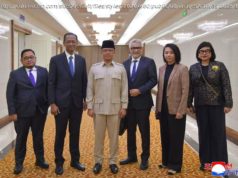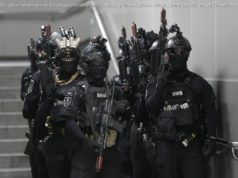An interview before the interview with the host of “CBS This Morning, ” who lived in Seoul for two years as a child.
Norah O’Donnell hoped to interview South Korean President Moon Jae-in during his first-ever visit to the White House this month. Moon said he didn’t have time but made a counteroffer: How about an interview before the trip — in Seoul?
“We decided that was worth doing, ” said O’Donnell, who co-hosts “CBS This Morning.” “Even though it’s a 14-hour flight.”
The interview, Moon’s first with an American broadcaster since his election in May, comes at a critical moment. Moon campaigned on a plan to reopen diplomatic talks with North Korea, whose nuclear ambitions Defense Secretary Jim Mattis recently called “the most urgent and dangerous threat to peace and security.” One of Moon’s first acts as president was to halt implementation of a U. S. missile-defense system in South Korea that was conceived as a check on North Korea.
Moon will have a lot to talk about with President Trump — but not until he sits down with O’Donnell on Tuesday.
Before taking off, O’Donnell spoke with The Fix about the interview, perceptions of Trump and the U. S. media abroad, and the two years she spent in South Korea as a child. The following conversation has been edited for clarity and length.
THE FIX: This trip will be somewhat of a homecoming for you.
O’DONNELL: Yeah, I grew up in a military family and lived all over the world. And when I was 10 years old, my father was assigned to Seoul, and Yongsan, which is the Army base that’s still there, to this day. So I lived there for fifth and sixth grade and really had an incredible experience. We studied Korean — certainly didn’t become fluent but learned some of it, enjoyed the food. I have a sister who was born there.
Also, it was my first experience doing broadcast work because my mom had met some people on the base who said, “We know someone looking for Americans to do English tapes and educational programs. Would you be interested?” So, that was really my first job. At 10 years old, I helped to teach English because in Korea, in middle school, you’re required to start learning English as a second language.
What are you hoping to get out of your interview with President Moon? I could see a few different focal points. He’s new in office, and this might be the first time a lot of American viewers are meeting him. You might want to talk about his upcoming visit to the White House. You could talk about the missile-defense system. Will you touch it all?
We’re expecting to have a good amount of time with President Moon to do a wide-ranging interview inside the Blue House. So, we’re hopefully going to hit a number of topics. First and foremost, the defense secretary himself has said the North Korean nuclear program is the most urgent threat to national security.
The most fascinating thing about President Moon is that, as you know, he’s for the Sunshine Policy. He wants a dialogue with North Korea… not only to discuss denuclearization but to discuss a peace agreement. You know, 64 years after the Korean War, there’s still no peace agreement. So he has ambitious goals. This is probably the most fascinating time to talk to the president of South Korea.
It occurs to me that a lot of interview subjects these days seem to be talking directly to President Trump through interviews. An example would be Christopher Ruddy of Newsmax on PBS this week, breaking the news that Trump might consider terminating the Russia special counsel, Robert S. Mueller III, and signaling to him in the same interview: Mr. President, that would be a bad idea. I wonder if that is something you’re thinking about — whether President Moon might be trying to speak to the White House through this interview with you.
You know, there’s no way for me to know that. I don’t have any indication of that. But there’s no doubt that this interview and President Moon’s words will not only be viewed by our administration in the United States but also around the world, including by the North Korean regime and the Chinese and the Japanese.
What he has to say has a number of implications, certainly about his view of President Trump and U. S. national security policy. I think what President Moon says in this interview will be closely viewed in capitals around the world.
Do you have a sense of how South Koreans view the U. S. media and its relationship with President Trump? He would lump CBS in with the “fake news media.” I’m wondering whether those attacks have a corrosive effect on the reputation of our independent press abroad.
It’s a good question. That’s a worthy thing to look at. I try not to let it affect me or my job, to be honest. I look at this as something we worked really hard to get. Korea is a lifetime interest of mine, and that was conveyed to the South Korean officials. I think the seriousness that CBS News brings to the table all the time and my record of treating world leaders fairly is a reason we got this interview.
What about South Korean media? Have you studied coverage of President Moon in his own country? Will you be asking the same kinds of questions he gets from his own journalists, or will this be a new experience for him?
A couple interesting things I’ve learned: The Korean press — there’s so much of it. There are hundreds of newspapers. It’s a flourishing business in South Korea.
He has something like a 75 percent approval rating, President Moon. He’s viewed as this Regular Joe who has a rescue dog and his cats living in the Blue House. The image of the regular guy that he’s been able to portray has helped make him very popular. He’s very savvy.
Start
United States
USA — Korea Why does South Korea’s new president want to talk to North Korea?...






